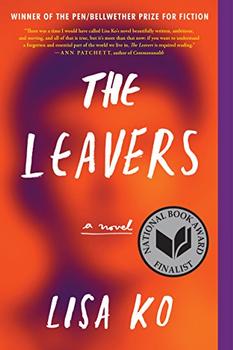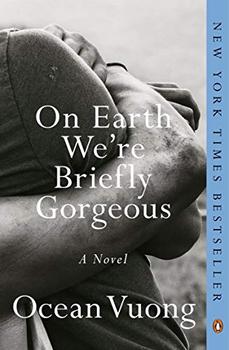Summary | Excerpt | Reviews | Beyond the book | Read-Alikes | Genres & Themes | Author Bio

The day before Deming Guo saw his mother for the last time, she surprised him at school. A navy blue hat sat low on her forehead, scarf around her neck like a big brown snake. "What are you waiting for, Kid? It's cold out."
Short and blocky, she wore loose jeans – never had he seen her in a dress – and her voice was so loud that when she called his name dogs would bark and other kids jerked around. When she saw his last report card he thought her shouting would set off the car alarms four stories below. But her laughter was as loud as her shouting…
In Lisa Ko's debut The Leavers, her two protagonists' quirks are on display and their love for each other is palpable and solid.
In Part One, which is told in third person, Deming, an eleven-year-old boy who has never known his father, lives with his mother, Peilan; her boyfriend; and the boyfriend's cousin and her son in a tiny Bronx apartment. Deming's mother and the cousin work in nail salons and the boyfriend works in a slaughterhouse. Despite their penury, they manage to have fun and take joy in activities like riding the subway trains to the end of the line and exploring new neighborhoods. Deming struggles with his schoolwork, but clearly has an aptitude for music and seems gifted with synaesthesia – the mixing of senses – experiencing sounds as vibrant colors. From a young age he's tuned in to all the sounds a city can make.
Peilan disappears one day following a raid on the nail salon by immigration police. She had already threatened to move to Florida, because she felt constricted and hopeless about any future uptick in her finances in New York, promising to send for Deming when she is secure. Now, no one knows where she is or what's become of her. The weeks go by and her boyfriend, despondent, goes back to China. With the abrupt loss of two sources of income, Deming's cousin is forced to place him in foster care. He's given no explanation and has no insight into the traumatic turn his life takes as he finds himself adopted by a white couple from upstate New York and whisked away from all that is familiar. The couple raise him in a white privileged upper middle class environment, and he grows up with no access to his former family or culture, barely remembering his native tongue.
Ten years later, Deming is a college dropout with a gambling problem, playing guitar here and there, crashing on the couch of a musician friend, very lost and hurt and wounded. His adoptive parents, two college professors, refuse to accept that he is not destined for an academic career. Loving and well meaning, they are clueless about Deming's mental state or psychological needs. The reader has to wonder at their marked lack of perception – they seem never to have heard of therapy – and grieves with Deming over all he has lost.
Part Two opens with a first person narration: Peilan speaks and finally we hear her side of the story, starting with her early life in a small village in China outside Fuzhou. She fills us in on her motherless childhood, and her experience being raised by her fisherman father. From the outset, she strains against the confines of her existence. First she becomes one of the only women to work in the city; later, pregnant, she smuggles herself to America. When life becomes oppressively hard as a single parent with very limited means, she ships Deming off to his grandfather for a few years, eventually bringing him back when he is six years old.
Lisa Ko clearly conveys the depth of Deming's depression in Part One, and the reader's sympathies are one hundred percent in his corner; the incalculable hurt he has suffered when his relationship with his mother is so summarily severed is palpable. But then Peilan reenters the picture in Part Two, and the reader learns the truth about where's she's been and is left to judge whether she made all the right choices. Was there even a right choice? As the reader toggles back and forth, weighing the options that presented themselves, there is no question about Peilan's abiding love for Deming. But…perhaps there are some things in life that she loves more? Ko lays out all the facts and then stands back: Was Peilan justified in her actions? Could she have predicted the suffering Deming would undergo? From a moral perspective, whose life is more important and should take precedence: mother or child? Or parent? Or lover? Whatever answers the reader comes to, it is impossible not to appreciate the beautiful and layered portrayal of these characters, the colorful imagery of the landscape and story, and the wake-up call to the fate of immigrants and adoptees yesterday, today and in the future.
![]() This review was originally published in The BookBrowse Review in May 2017, and has been updated for the
May 2018 edition.
Click here to go to this issue.
This review was originally published in The BookBrowse Review in May 2017, and has been updated for the
May 2018 edition.
Click here to go to this issue.

If you liked The Leavers, try these:

by Aria Aber
Published 2025
An electric debut novel about the daughter of Afghan refugees and her year of nightclubs, bad romance, and self-discovery—a portrait of the artist as a young woman set in a Berlin that can't escape its history.
A girl can get in almost anywhere, even if she can't get out.

On Earth We're Briefly Gorgeous
by Ocean Vuong
Published 2021
Poet Ocean Vuong's debut novel is a shattering portrait of a family, a first love, and the redemptive power of storytelling.
Your guide toexceptional books
BookBrowse seeks out and recommends the best in contemporary fiction and nonfiction—books that not only engage and entertain but also deepen our understanding of ourselves and the world around us.